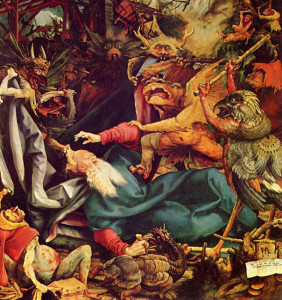Christians first engage the surrounding culture in their own hearts and minds.
This is important to grasp. Well meaning people misunderstand Benedictine withdrawal from the world as a lack of engagement with culture. Not so.
The gospel is ‘news’, new information, an announcement with conceptual content. When Jesus appears to His disciples after the Resurrection, he teaches, He opens minds and sets hearts on fire.
But the Apostles are ‘slow to believe’. Why is this? The major difficulty in accepting the Resurrection and its consequences is the formation of the surrounding culture. The culture in which we were raised sets the limits on what seems possible, what appears to be normal, obvious, and decent. Our minds are formed by the totality of cultural influences. Of course, we have some choice in the matter, but our choices in what to agree to as normal, possible, and reasonable are almost always severely limited by the ideas to which we have been exposed. One of the goals of a traditional liberal education (of which I am a big proponent, by the way) is precisely to ‘liberate’ the mind from the narrowness of one’s early formation.
Our Western culture (and the subculture of America) used to provide a formation that was more obviously Christian. This had advantages as well as disadvantages, like any cultural situation. The advantage was that belief was relatively easy, and for those who were captivated by the gospel, perhaps less effort was needed to undergo the conversion necessary to become, say, a contemplative religious like a Poor Clare nun or a Trappist monk. The downside (and there was one) was, alas, also that belief was relatively easy. This could give the mistaken impression that simply going along with cultural norms, the reasonable and decent, was equivalent to living the gospel. The average churchgoer could lose sight of the radical newness and the demands of the gospel.
In today’s world, when someone steps back from the world and enters a cloister, one does not automatically start thinking, feeling and acting like a Christian saint. In fact, the new monk or nun carries the culture right into the cloister. New patterns of behavior and new ideas are sometimes comforting, but often enough, they simply make painfully obvious the ways in which culture has deformed us. Again, this is true in any age. No culture in this world is equivalent to the Kingdom of God, pace Eusebius of Caesarea (in his less sober moments).
When St. Antony the Great,
a cradle Christian, raised on the sacraments and Scriptures of the Church, fled into the Egyptian desert, he encountered the demons of his own inner world, projections of his complicity with the fallen culture of his own age. The desert is a symbolic place of testing, a kind of blank screen upon which is projected the inner habits of thinking and feeling that we all carry around. Normally, we are largely unconscious of their effect and ultimate meaning–we are largely unconscious of doing much thinking at all. When everyone around us is thinking and feeling more or less the same way as we are, we don’t easily notice our own complicity with un-evangelical patterns of thinking and feeling, even when listening to the gospel being read. We might even be tempted to assure ourselves that we are living a quite exemplary life. St. Basil the Great warns us that we can become smugly overconfident by comparing ourselves with persons of particularly broken character.
So the monk or nun who withdraws from the world does not disengage with culture in the least. In fact, I would like to suggest that it is precisely in the battleground of the heart where the cultural engagement is most systematically carried out and its fruits discerned.
Nor do I believe that engagement of this sort is impossible for persons living in the world. I do think that it is difficult, even dangerous, to attempt it outside of a supportive community environment, where our conversion can be monitored, our choices challenged, our progress affirmed, and new behaviors can be cultivated. St. John Cassian and St. Benedict (and many other monastic writers) caution us about the dangers of self- deception when we enter this battle without any supervision.
Let me conclude by emphasizing that conversion is integral, and includes pre-eminently the conversion of the mind: we become new persons, not just the same old persons with new behaviors, or with new ideas, or with new feelings. All of the qualities that make me me are up for change when I step into the baptismal font and say, “Yes. I believe.” This is the adventure that every Christian has undertaken.
For us to undergo the renewal of our minds [Rom 12: 2] and not be conformed to this world, we need to have our ideas shaken up. The Scriptures hold pride of place, of course, but “How can I [understand what I am reading] unless someone guides me?” [Acts 8: 30-31] We need reliable guides. In our monastery’s formation program, we have picked out a small library of books that we find particularly helpful in unlocking the gospel message for those whose cultural formation is in the contemporary modern West. The next post will begin a series in which I review each of these books, offering some insights as to how they will assist attentive readers to love God “with all the understanding [Mark 12: 33].”
